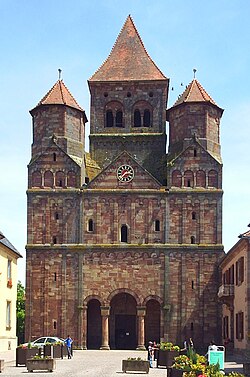Marmoutier Abbey, Alsace
| Imperial Abbey of Marmoutier | ||||||||||
|
Reichskloster Morsmünster (de) Abbaye impériale de Marmoutier (fr) Reichskloschter Màschmínschter (gsw) |
||||||||||
| Imperial Abbey of the Holy Roman Empire | ||||||||||
|
||||||||||
|
Former abbey church in the main street of Marmoutier
|
||||||||||
| Capital | Marmoutier Abbey | |||||||||
| Government | Theocracy | |||||||||
| Historical era | Middle Ages | |||||||||
| • | Established | by 659 | ||||||||
| • | Refounded by Saint Pirmin | 728 | ||||||||
| • | Sacked during Peasants' War | 1525 | ||||||||
| • | Sacked by Swedish troops during the Thirty Years' War |
1621 |
||||||||
| • | Dissolved during the French Revolution |
ca 1789 |
||||||||
|
||||||||||
| Today part of |
|
|||||||||
Marmoutier Abbey, otherwise Maursmünster Abbey, was a Benedictine monastery in the commune of Marmoutier in Alsace.
The first foundation here, either in the late 6th century, or by Saint Leobard (d. here in about 680) in 659, was a community of Irish monks under the Rule of St. Columbanus. Then known as Aquileia, after the town in Italy, it was one of the Merovingian abbeys and a Reichsabtei.
In 728 century Saint Pirmin reformed the Columban monasteries in Alsace, including this one, introducing to them the Rule of St. Benedict. The first abbot under the new rule was Maurus, from whom the place took the name of Maursmünster in German, of which Marmoutier is the French version.
After two centuries of restriction and loss of income, the abbey, under Abbot Meinhard and his successors in the 12th century, enjoyed a long period of growth and prosperity, including the consolidation of the large territory. In the 12th century the abbey church of St. Stephen's was built, which still stands today as an imposing Romanesque church. The west end, with its three massive towers, is especially striking.
...
Wikipedia


